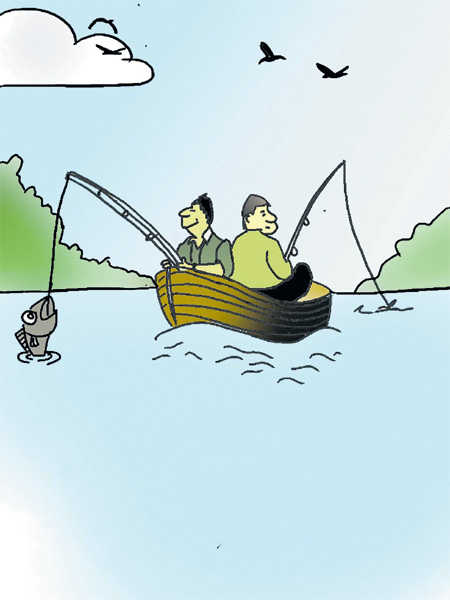
ILLUSTRATION: VISHU VERMA
Harvinder Khetal
The main attraction of my holiday in the Chennai-Puducherry-Mahabalipuram coastal areas recently was the beach. I sat on the shore for hours to see the sea, see some ships, savour the endless soaring-and-receding waves, select the shells, build sand castles only to lose them soon enough to the sea, sense the sand slip from under my shoes, be soaked by the salty waters slapping on the beach, with sand as a scrubbing add-on, of course. The smell of the sultry weather, the stink of marine life, notwithstanding. As the sea seamlessly rippled on to eternity, seemingly meeting the sky on the horizon, I was humbled by the realisation of what a small speck I was in front of it all.
A slightly bigger wave gushing and crashing on me, pushing me around like a nobody, made me gush about its strength, about spirituality, philosophy. I was fishing for philosophy. To fish for is to try to obtain something through artifice or indirectly.
I was hooked on this awesome show of Nature, each new approaching wave holding the same attraction and suspense as the next episode of one’s favourite TV serial. Will it rise high and strong for the waters to reach me and touch me or will it lose steam and lamely break off midway? The Bay of Bengal waters were fun, calming, soothing and intimidating at the same time. To be hooked on something is to be totally captivated by it, just as a fish gets hooked on the bait. To be hooked on also means to be addicted to (a drug).
As we sliced through the water in a speeding motor boat ferrying us to the island called the ‘Paradise Beach’ in Puducherry, we encountered a number of fishermen out in their boats, at work with fishing rods and nets cast to catch the catch (the fish caught).
The island was a tourist’s delight. Nobody was at sea (lost or bewildered) there. Everyone was having fun ’n frolic in his/her own way. It was one place that had no place for the pestering tourist guides. The white sandy beach invitingly beckoned one to take a splash or a dip on the shore. A lifeguard whistled to warn anyone from venturing too far inside. The little shacks dotting the isle doubled as washing areas, to wash the sand off you. Some preferred the enclosure for ‘rain dance’ to do this. Interestingly, on this South Indian beach, Punjabi music was blaring and Honey Singh numbers were the favourite. The machaans (a platform, as in a tree, used for observation in tiger hunting) gave one a spectacular overview of the ‘paradise’. Thatch-roofed huts served as eateries and a scaffold unit on stilts sold refreshing tender coconut water.
No wonder, so many people fall hook, line and sinker for the day trip. The hook, line and sinker are the three essential pieces of a fishing rod used in angling (fishing). The hook catches the fish, the line is the string and the sinker is the weight attached to keep the line under water. When a fish takes the hook, part of the line, and the sinker, it is completely trapped. To swallow something hook, line and sinker is an idiomatic expression to describe a situation where a person accepts or is tricked into fully believing an idea or set of beliefs.
As we know that 75% of the earth is water and only 25% land, it is not surprising that fishing and sailing are activities most commonly undertaken. And, they have given a number of phrases and expressions to the language. Did you know that to open a can of worms is related to fishing? Initially, worms were sold in cans as bait for fishing. The cans were easy to open but difficult to close because the worms kept wiggling out. So, when you do something or say that seems to be simple but then causes problems, you have opened a can of worms.
About fishing, it is famously said:
Give a man a fish, and you feed him for a day. Teach a man to fish, and you feed him for a lifetime.
The piscatory (of, relating to, or dependent on fish or fishing) environment is evident along the East Coast Road to Chennai as we spot shrimp and prawn hatcheries. The salt beds on the backwaters also are a sight.
The fisherman’s cove adjoining the Shore Temple in Mahabalipuram (built in 700 AD, today a Unesco World Heritage Site) also set me on the philosophical trail. As I saw the fishermen starting their day early morning, it struck me that we often callously screw up our noses as fish, all nicely cooked, lands on our table. We must spare a thought for the fishermen and seafarers who set out to sail on the unpredictable waters to get the catch for us. Often, they are swallowed by the choppy currents. Or, end up in neighbouring alien lands and languish in their custody.
But, I think the author of this line thinks otherwise:
A bad day of fishing is better than a good day of work.



























